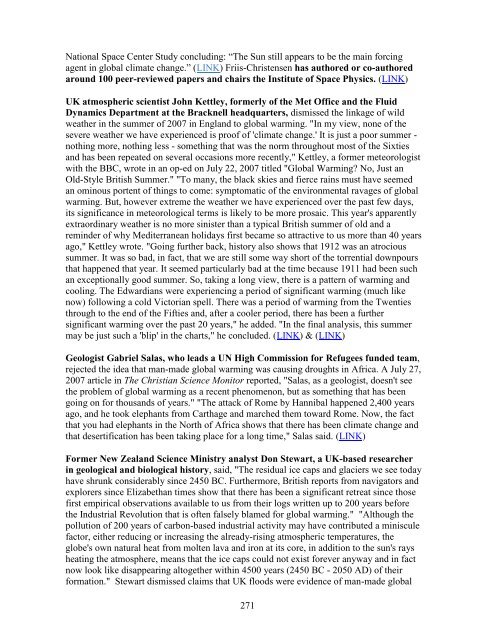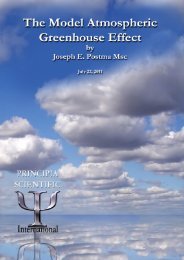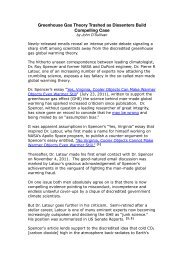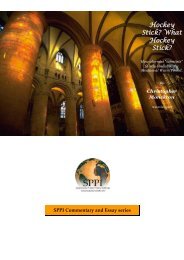Than 1000 International Scientists Dissent Over Man-Made Global ...
Than 1000 International Scientists Dissent Over Man-Made Global ...
Than 1000 International Scientists Dissent Over Man-Made Global ...
Create successful ePaper yourself
Turn your PDF publications into a flip-book with our unique Google optimized e-Paper software.
National Space Center Study concluding: ―The Sun still appears to be the main forcing<br />
agent in global climate change.‖ (LINK) Friis-Christensen has authored or co-authored<br />
around 100 peer-reviewed papers and chairs the Institute of Space Physics. (LINK)<br />
UK atmospheric scientist John Kettley, formerly of the Met Office and the Fluid<br />
Dynamics Department at the Bracknell headquarters, dismissed the linkage of wild<br />
weather in the summer of 2007 in England to global warming. "In my view, none of the<br />
severe weather we have experienced is proof of 'climate change.' It is just a poor summer -<br />
nothing more, nothing less - something that was the norm throughout most of the Sixties<br />
and has been repeated on several occasions more recently," Kettley, a former meteorologist<br />
with the BBC, wrote in an op-ed on July 22, 2007 titled "<strong>Global</strong> Warming? No, Just an<br />
Old-Style British Summer." "To many, the black skies and fierce rains must have seemed<br />
an ominous portent of things to come: symptomatic of the environmental ravages of global<br />
warming. But, however extreme the weather we have experienced over the past few days,<br />
its significance in meteorological terms is likely to be more prosaic. This year's apparently<br />
extraordinary weather is no more sinister than a typical British summer of old and a<br />
reminder of why Mediterranean holidays first became so attractive to us more than 40 years<br />
ago," Kettley wrote. "Going further back, history also shows that 1912 was an atrocious<br />
summer. It was so bad, in fact, that we are still some way short of the torrential downpours<br />
that happened that year. It seemed particularly bad at the time because 1911 had been such<br />
an exceptionally good summer. So, taking a long view, there is a pattern of warming and<br />
cooling. The Edwardians were experiencing a period of significant warming (much like<br />
now) following a cold Victorian spell. There was a period of warming from the Twenties<br />
through to the end of the Fifties and, after a cooler period, there has been a further<br />
significant warming over the past 20 years," he added. "In the final analysis, this summer<br />
may be just such a 'blip' in the charts," he concluded. (LINK) & (LINK)<br />
Geologist Gabriel Salas, who leads a UN High Commission for Refugees funded team,<br />
rejected the idea that man-made global warming was causing droughts in Africa. A July 27,<br />
2007 article in The Christian Science Monitor reported, "Salas, as a geologist, doesn't see<br />
the problem of global warming as a recent phenomenon, but as something that has been<br />
going on for thousands of years." "The attack of Rome by Hannibal happened 2,400 years<br />
ago, and he took elephants from Carthage and marched them toward Rome. Now, the fact<br />
that you had elephants in the North of Africa shows that there has been climate change and<br />
that desertification has been taking place for a long time," Salas said. (LINK)<br />
Former New Zealand Science Ministry analyst Don Stewart, a UK-based researcher<br />
in geological and biological history, said, "The residual ice caps and glaciers we see today<br />
have shrunk considerably since 2450 BC. Furthermore, British reports from navigators and<br />
explorers since Elizabethan times show that there has been a significant retreat since those<br />
first empirical observations available to us from their logs written up to 200 years before<br />
the Industrial Revolution that is often falsely blamed for global warming." "Although the<br />
pollution of 200 years of carbon-based industrial activity may have contributed a miniscule<br />
factor, either reducing or increasing the already-rising atmospheric temperatures, the<br />
globe's own natural heat from molten lava and iron at its core, in addition to the sun's rays<br />
heating the atmosphere, means that the ice caps could not exist forever anyway and in fact<br />
now look like disappearing altogether within 4500 years (2450 BC - 2050 AD) of their<br />
formation." Stewart dismissed claims that UK floods were evidence of man-made global<br />
271





